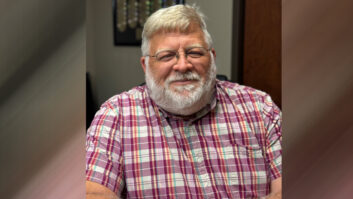
Jennifer Nigro. Photo by KU Marketing Communications
The author is the board secretary of the International Association of Audio Information Services (IAAIS) and coordinator of volunteers for the Audio-Reader Network in Lawrence, Kan. IAAIS commentaries are featured regularly at radioworld.com.
I came to the radio reading industry with little knowledge of its purpose, scope and necessity. I was looking to leave my job as a commercial television producer when I stumbled on a volunteer coordinator position at the Audio-Reader Network in Lawrence, Kan. It piqued my interest for many reasons: no commute, daytime hours, a slower pace (or so I thought at the time!) and the chance to continue to use my broadcasting skills. I was hired — and there began my education.
My first order of business was to re-train my brain on just what constitutes news. I remember my first week, learning how to prepare newspapers from northwest Missouri for our volunteer readers. As I sat there, red marker in hand, I thought, “There is no news in this paper. Who cares about a new bank branch opening? The ambulance board levy? A fender bender? None of this would have made my evening news broadcast.”
It didn’t take long to answer the “who cares” question. The people who listen to radio reading services care. In fact, we ALL care, though the size of the daily newspaper we read may vary. The more I read the more I realized THIS was the news I myself craved when I traveled home to visit my parents in northeast Iowa. On those visits I would pick up the local weekly newspaper and catch up on who died, who got married and what was going on at the local school. A light bulb went off. This is one of the many reasons radio reading services exist: to provide local, timely news to people who aren’t going to find that news anywhere but their local newspaper. We never lose the desire to know what’s going on in our local communities, even when we begin to lose our sight. Audio Information Services allow people to continue to access their local paper independently.
The relevance of radio reading services has been questioned of late. Why do it at all when technology allows people to read articles online using a computer and screen reading software?
The answer comes from the listeners we work with every day. When it comes to technology, one size does NOT fit all.
Imagine you have been sighted all your life, and due to an accident you are no longer able to see. You have a lot to learn to adapt to your condition. What are you going to do first: learn how to use screen reading software, or learn how to cook your food, operate your washing machine and match your clothes without relying on others? My answer? I’m going to learn the basics, and get a radio from an Audio Information Service to take care of my reading needs until such time I can take on the new technology.
Some of our listeners were never comfortable with computers before they lost their sight; the likelihood they will learn how to use one after experiencing vision loss small. Even those who have been blind since birth and are computer savvy report screen readers get hung up on web graphics — when we share web links among IAAIS members we often get requests to paste the text into the email because the website doesn’t allow them to access the entire article. In fact, we experienced just that problem when sharing the August 27 Radio World article, “Radio Reading Services Face Obstacles.”
For others, financial limitations keep them from purchasing screen reading software, which can cost nearly a thousand dollars up front and requires an additional fee for license renewal. Even if screen reading software provided a perfect online reading experience, the content our listeners crave may not be available. The Independence Daily Reporter in Independence, Kan., doesn’t have an online edition. How would our listeners in Independence get their local news without Audio-Reader?
Technology has also led to a vast improvement in electronic voices. Why, then, do reading services utilize thousands of volunteers to read our content? There are times when the human voice can convey the material being read more effectively. As one RIS colleague pointed out at a recent conference, listening to an electronic voice reading “Fifty Shades of Grey” would not be quite the same as listening to a human voice. Then there is the need for human connection. So many of our listeners are homebound or in care facilities — we might be the only human voice they hear on a given day. This is why we read every day — on weekends, on holidays and during snow storms. This is why many of us broadcast 24 hours a day, seven days a week — we are there for our listeners. Many of Audio-Reader’s volunteers have gone on to make personal connections with listeners after receiving a letter thanking them for their service.
Why radio reading? Audio Information Services make the printed word accessible to people with vision and print impairments in a way no other industry can, and we do it on a scale few can match. Technology is a spectrum. Formats will come and go. But Audio Information services are not dying. The professionals who work in this industry every day are committed to growing and changing along with the technology available to meet the varied needs of our listeners. We hope you’ll join us as we explore this vibrant niche in the world of broadcasting.






